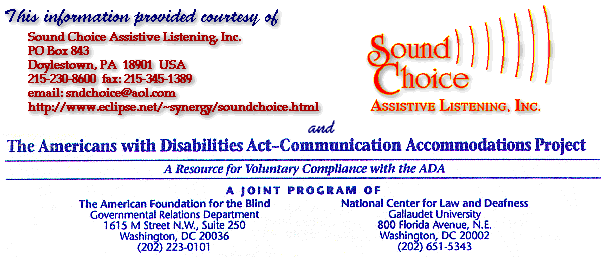
TITLE III OF THE AMERICANS
WITH DISABILITIES ACT: PROVISION OF AUXILIARY AIDS BY PUBLIC
ACCOMMODATIONS
Title III of the Americans with Disabilities Act, 42 U.S.C.
Sections 12182, 12183, (ADA) provides people with
disabilities with the rights to equal access to public
accommodations. For deaf and hard of hearing people, Title
III and its regulation will be of tremendous help in
removing communication barriers.
Title III covers a wide range of
places, such as hotels, theaters, restaurants, doctors' and
lawyers' offices, banks, insurance agencies, retail stores,
museums, parks, libraries, day care centers and private
schools. All of these public accommodations are required to
provide auxiliary aids and services to ensure effective
communication with deaf and hard of hearing people. The ADA
also requires the removal of structural communication
barriers that are in existing facilities, by the
installation of flashing alarm systems, permanent signage,
and adequate sound buffers.
Auxiliary Aids
The U.S. Department of Justice
regulation to Title III of the ADA, 28 C.F.R. Part 36, and
the Analysis thereto, 56 Fed. Reg. 35544 - 35691 (July 26,
1991), explain in detail the requirements of this title.
Public accommodations are required to provide auxiliary aids
when such are necessary to enable a person with disabilities
to benefit from their services:
A public accommodation shall
furnish appropriate auxiliary aids and services where
necessary to ensure effective communication with
individuals with disabilities.
8 C.F.R. Section 36.303(c).
A public accommodation may avoid
provision of an auxiliary aid only if it can demonstrate
that provision of such would fundamentally alter the nature
of the service, or would constitute an undue burden or
expense. If the public accommodation is able to demonstrate
that there is a fundamental alteration or an undue burden in
the provision of a particular auxiliary aid it must,
however, be prepared to provide an alternative auxiliary
aid, where one exists. 28 C.F.R. Section
36.303(f).
A comprehensive list of auxiliary aids
and services required by the ADA is set forth in this
regulation, and includes, for deaf and hard of hearing
individuals:
qualified interpreters,
notetakers, computer-aided transcription services,
written materials, telephone handset amplifiers,
assistive listening devices, assistive listening systems,
telephones compatible with hearing aids, closed caption
decoders, open and closed captioning, telecommunication
devices for deaf persons (TDD'), videotext displays, or
other effective methods of making aurally delivered
materials available to individuals with hearing
impairments.
28 C.F.R. 36.303(b)(1).
The term qualified interpreter is
defined in the regulation to mean:
. . . an interpreter who is
able to interpret effectively, accurately and impartially
both receptively and expressively, using any necessary
specialized vocabulary.
28 C.F.R. 36.104
The Analysis to this regulation makes
it clear that Congress, as well as the Department of
Justice, "expects that public accommodations will consult
with the individual with a disability before providing a
particular auxiliary aid or service." 56 Fed. Reg. at 35567.
The Department of Justice further stated in its
Analysis:
It is not difficult to
imagine a wide range of communications involving areas
such as health, legal matters, and finances that would be
sufficiently lengthy or complex to require an interpreter
for effective communication.
56 Fed. Reg. at 35567.
We hope that this information will be
of assistance. Please let us know if there are any
questions.
Funded by a Grant
from the U.S. Department of Justice
|